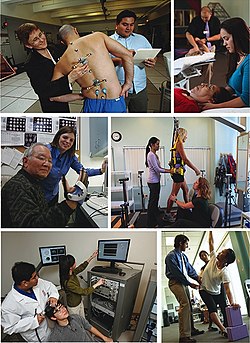
Kinesiology (from Ancient Greek κίνησις (kínēsis) 'movement' and -λογία -logía 'study of') is the scientific study of human body movement. Kinesiology addresses physiological, anatomical, biomechanical, pathological, neuropsychological principles and mechanisms of movement. Applications of kinesiology to human health include biomechanics and orthopedics; strength and conditioning; sport psychology; motor control; skill acquisition and motor learning; methods of rehabilitation, such as physical and occupational therapy; and sport and exercise physiology. Studies of human and animal motion include measures from motion tracking systems, electrophysiology of muscle and brain activity, various methods for monitoring physiological function, and other behavioral and cognitive research techniques.[1][2]
- ^ Bodo Rosenhahn, Reinhard Klette and Dimitris Metaxas (eds.). Human Motion - Understanding, Modelling, Capture and Animation. Volume 36 in Computational Imaging and Vision, Springer, Dordrecht, 2007
- ^ Ahmed Elgammal, Bodo Rosenhahn, and Reinhard Klette (eds.) Human Motion - Understanding, Modelling, Capture and Animation. 2nd Workshop, in conjunction with ICCV 2007, Rio de Janeiro, Lecture Notes in Computer Science, LNCS 4814, Springer, Berlin, 2007